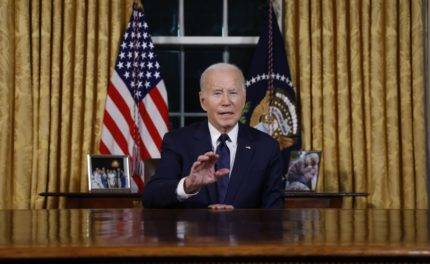Recent data from a Financial Times poll conducted in collaboration with Michigan Ross reveals a concerning trend for President Joe Biden’s administration. With 58% of Americans expressing disapproval of Biden’s handling of the economy, there is a clear erosion of support for his economic policies. This disapproval rating marks an increase from 55% recorded last month, indicating a growing dissatisfaction among voters.
One of the primary concerns contributing to this sentiment is the looming specter of inflation. The poll indicates that a staggering 80% of voters identify high prices as one of their most significant financial challenges. This widespread anxiety about inflation has become a pressing issue for many Americans, overshadowing other economic indicators.
The latest figures from the consumer price index suggest a worrying trend of rising inflation, despite a period of relative stability last year. Inflationary pressures are evident in essential areas such as petrol and food prices, exacerbating the financial strain on households across the country. As a result, confidence in President Biden’s ability to manage the economy has faltered, with only 28% of voters acknowledging his contributions to the economic well-being of the nation.
Joe Biden’s Re-election Prospects Under Pressure
The findings of the FT-Michigan Ross poll paint a challenging picture for President Joe Biden as he navigates the path to re-election. With less than six months remaining until the November presidential election, the data underscores the significance of economic issues in shaping voter sentiment.
Despite the positive indicators of a booming economy and a robust job market, voters continue to hold President Biden accountable for the persistent inflationary pressures. The personal consumption expenditures index, which rose to 2.7% in the year to March, surpassing the Federal Reserve’s 2% target, reflects the severity of the inflationary challenge facing the administration.
Furthermore, the declining consumer sentiment, as indicated by the University of Michigan’s index, highlights the erosion of public confidence in the administration’s ability to address inflation concerns effectively. This growing disillusionment with President Biden’s economic stewardship not only threatens his re-election prospects but also complicates the policy landscape, particularly regarding the possibility of significant rate cuts to mitigate inflationary pressures.
As the nation awaits the release of the latest consumer price index numbers, the Biden administration faces mounting pressure to demonstrate tangible progress in addressing inflation and restoring confidence in its economic policies. Failure to effectively tackle these challenges could have far-reaching implications for both the administration and the broader economic landscape heading into the upcoming presidential election.
Consumer Sentiment Dips Amid Rising Inflation Concerns Ahead of US Presidential Election
As the latest consumer price index numbers loom, Americans are bracing for fresh insights into the trajectory of prices amidst growing concerns over inflation. The University of Michigan’s key index of US consumer sentiment, released recently, revealed a disheartening trend as it plummeted to its lowest level since November. This decline is primarily attributed to worsening inflation expectations, exacerbating the economic landscape ahead of November’s presidential election.
Rising Inflation and Voter Sentiment
The most recent federal data unveiled a concerning uptick, with the personal consumption expenditures index surging to 2.7 percent in the year to March, surpassing the Federal Reserve’s 2 percent target. This inflationary surge has tempered hopes for significant rate cuts in the near future, consequently keeping mortgage and borrowing costs elevated. Against this backdrop, voters continue to cast a wary eye on the economy, citing escalating consumer prices, particularly for essentials like petrol and food.
Moreover, a prevailing sentiment among voters suggests a reluctance to attribute the current economic boom solely to President Biden, instead placing blame for soaring prices squarely on his shoulders. This sentiment, underscored by the impending election, underscores the significance of economic policy as a pivotal campaign issue, with consumer sentiment acting as a barometer of public perception.
Candidate Trust and Voter Divides
Amidst escalating concerns over inflation, the monthly FT-Michigan Ross survey delivered further blow to the Biden administration, revealing a persistent trust deficit compared to his predecessor, Donald Trump, concerning economic stewardship. Notably, a significant portion of voters expressed a preference for Trump over Biden in handling the economy, signaling a looming challenge for the incumbent ahead of the elections.
Furthermore, the survey highlighted a stark divide among voters, particularly concerning blue-collar interests. While Biden and Trump share equal support among registered voters in representing these interests, a deeper analysis unveils a significant discrepancy based on educational attainment. University graduates overwhelmingly lean towards Biden as the champion of blue-collar workers, in stark contrast to non-college graduates, indicating a nuanced electoral landscape shaped by education and socio-economic factors.
As the nation grapples with escalating inflation and wavering consumer sentiment, the upcoming presidential election emerges as a critical juncture, wherein economic policies and the candidates’ ability to address burgeoning concerns will undoubtedly sway voter preferences. Against a backdrop of heightened economic anxiety, the trajectory of prices and subsequent policy responses will undoubtedly shape the electoral landscape, underscoring the imperative for both candidates to navigate these turbulent waters adeptly.
Table of Contents
Discover more from OGM News NG
Subscribe to get the latest posts sent to your email.














